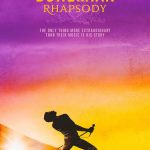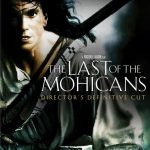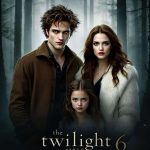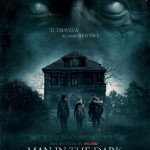Madagascar (2005)
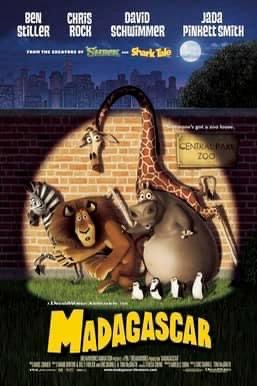
Madagascar (2005), directed by Eric Darnell and Tom McGrath, is a fun-filled animated adventure from DreamWorks that blends slapstick humor, endearing characters, and a vibrant setting into an entertaining family film. The movie follows a group of zoo animals who, after an unexpected turn of events, find themselves stranded on the island of Madagascar. With its colorful animation, memorable voice cast, and playful antics, Madagascar quickly became a fan favorite and marked the beginning of a successful franchise
Suggested videos for you:
Plot Overview
The story begins in the Central Park Zoo, where Alex the lion (voiced by Ben Stiller), Marty the zebra (voiced by Chris Rock), Melman the giraffe (voiced by David Schwimmer), and Gloria the hippo (voiced by Jada Pinkett Smith) enjoy the comforts of zoo life. Marty, feeling restless and yearning for freedom, escapes to explore the outside world, prompting his friends to follow him.
The group is soon captured and shipped to Africa, but after a series of comedic misadventures, they end up washed up on the remote island of Madagascar. Struggling to survive in the wild, the animals must contend with the island’s strange inhabitants, including a group of lemurs led by King Julien (voiced by Sacha Baron Cohen), and learn to adapt to their new environment.
As Alex and his friends face challenges, they discover that the wild is not as glamorous as they imagined. The film’s central themes focus on friendship, self-discovery, and the importance of embracing differences, all while delivering a comedic exploration of what happens when these pampered zoo animals are thrust into an untamed world.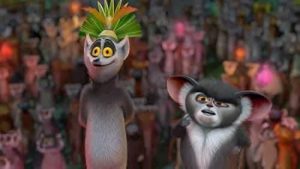
Themes and Emotional Resonance
While Madagascar is primarily a comedy, it also offers a message about self-discovery, friendship, and the clash between domesticity and the wild. Marty’s longing for freedom represents the desire for change and adventure, while Alex’s struggle with his primal instincts highlights the difficulties of adapting to new environments and finding balance in life.
The film’s emotional core lies in the friendship between the four main characters. Despite their differences, they support each other in the face of adversity, and their bond becomes stronger as they navigate the unfamiliar world of Madagascar. The characters also experience personal growth—Marty learns to appreciate the safety of his zoo life, while Alex comes to terms with the fact that he can’t always rely on his instincts.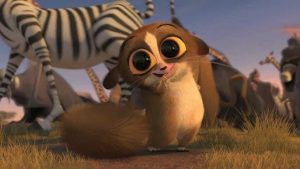
Characters and Performances
1.Alex the Lion (Ben Stiller): Alex is the quintessential zoo celebrity—charismatic, confident, and a little vain. Ben Stiller brings his signature humor and charm to the role, delivering both comedic lines and moments of self-reflection. Alex’s transformation from pampered predator to a more humble character is one of the film’s key emotional arcs.
2.Marty the Zebra (Chris Rock): Marty is the film’s dreamer, eager to break free from the confines of zoo life. Chris Rock’s fast-paced, energetic voice performance brings Marty to life, imbuing him with a sense of wonder and a dash of naiveté. Marty’s adventurous spirit drives the plot, and Rock’s comedic timing elevates the humor.
3.Melman the Giraffe (David Schwimmer): Melman is neurotic, anxious, and often the most worried of the group. David Schwimmer’s voice work adds a layer of sympathy and humor to the character, making Melman an endearing figure. His over-the-top paranoia adds to the film’s comedy, but his gradual growth and bond with Gloria provide moments of tenderness.
4.Gloria the Hippo (Jada Pinkett Smith): Gloria is the strong, sensible character of the group, offering a grounded contrast to the more excitable personalities. Jada Pinkett Smith brings a no-nonsense attitude to Gloria, making her both a protector and a calm voice of reason in the midst of chaos.
5.King Julien (Sacha Baron Cohen): As the eccentric and over-the-top lemur king, Sacha Baron Cohen’s performance steals the show. His voice acting is full of energy and flamboyance, and his antics provide much of the film’s comic relief. King Julien’s hilarious personality adds a memorable secondary character that stands out in the ensemble.
6.The Penguins (Tom McGrath, Chris Miller, Christopher Knights): The penguins, though secondary characters, are an integral part of the film’s humor. With their deadpan delivery and covert operations, the penguins add an extra layer of absurdity to the story, and their antics are often a highlight of the movie.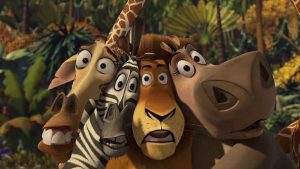
Animation and Visuals
The animation in Madagascar is bright, lively, and full of energy, making the most of the exotic setting. The characters are exaggerated with vibrant colors and expressions that help convey their personalities, from Alex’s majestic mane to Marty’s wobbly legs. The filmmakers use clever designs to make the animals feel more relatable, with human-like expressions and movements, all while keeping the animals’ distinctive physical traits intact.
The island of Madagascar is depicted with lush, tropical landscapes, complete with stunning visuals of wildlife and vibrant jungles. The film’s colorful animation style is full of whimsy, matching the zany tone of the story while keeping things visually engaging for both children and adults.
Music and Soundtrack
The soundtrack of Madagascar is filled with upbeat, lively tunes that match the film’s playful atmosphere. The most memorable piece of music is “I Like to Move It” by Reel 2 Real, which is performed by King Julien and quickly became synonymous with the movie. The song’s infectious rhythm perfectly encapsulates the carefree energy of the film and is often remembered as one of its most iconic moments.
The rest of the soundtrack features a mix of upbeat tracks and emotional undertones, enhancing the film’s various moments, whether they’re full of action, humor, or heartfelt interactions. The music supports the film’s tone, offering light-hearted fun with a dash of depth when needed.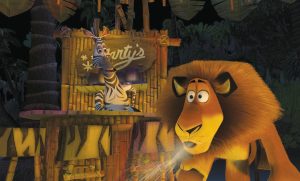
Criticisms
While Madagascar is an enjoyable film, it does lean heavily on formulaic storylines and familiar tropes, such as the animals adjusting to the wild and finding their way back to each other. While the movie’s humor is consistent, some may find the plot predictable, with a few characters feeling underdeveloped, particularly the secondary animals like the penguins, who don’t receive much character depth. Additionally, the film’s more dramatic moments could feel overshadowed by the frenetic pace and over-the-top humor.
Legacy and Impact
Madagascar was a commercial success, grossing over $532 million worldwide, and it led to several sequels, spin-offs, and a strong franchise presence. The film’s quirky humor, lovable characters, and catchy soundtrack made it a favorite among children and families, ensuring its place in the animated film canon. The movie also introduced audiences to the unforgettable King Julien, whose character would go on to have a life of its own in the Madagascar spin-off series All Hail King Julien.
Conclusions
Madagascar is an entertaining, lighthearted film that balances humor, heart, and adventure. With its colorful animation, memorable characters, and catchy music, it appeals to a wide audience, making it a fun and engaging choice for family viewing. While its story may not break new ground, the film’s comedic energy, emotional moments, and strong voice performances make it a standout in the world of animated comedies. Madagascar is a wild, wacky adventure that’s hard to resist.
